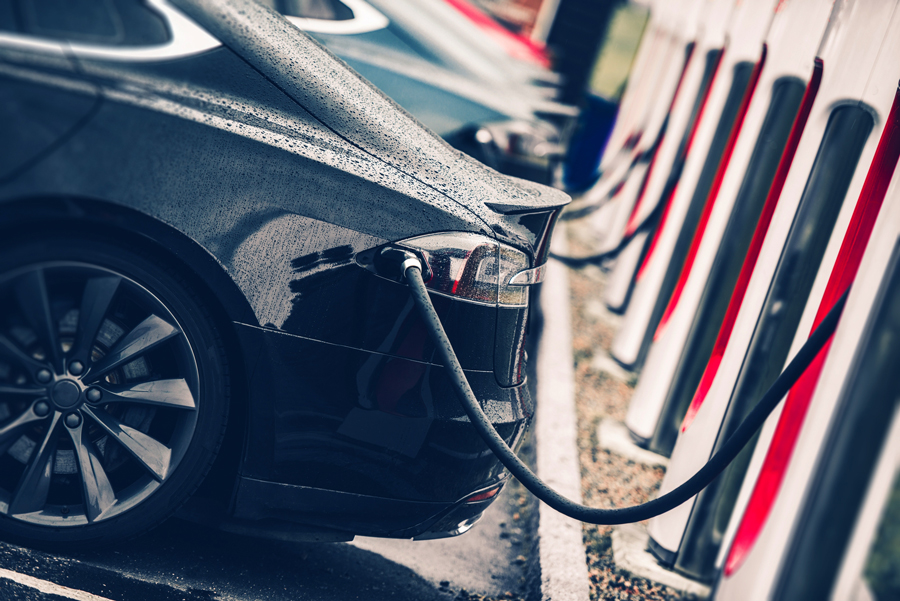BY EDWARD KAYE AND MATT DAUS
It is only a matter of time until you finance or lease your first electric vehicle (EV). Either your clients will demand it, your options to buy internal combustion engine (ICE) vehicles will be limited, or you will buy to keep up with the competition.
 While small transportation companies will hold off purchasing EVs for as long as possible due to the higher purchase prices, despite the challenges related to EV adoption, many large and midsize companies have started to embrace electrification, setting up charging infrastructure in their facilities, and experimenting with various vehicles targeting the bus and livery market. In fact, Kelley Blue Book recently reported that sales of EVs hit a record in Q3 of 2022, selling more than 200,000 vehicles!
While small transportation companies will hold off purchasing EVs for as long as possible due to the higher purchase prices, despite the challenges related to EV adoption, many large and midsize companies have started to embrace electrification, setting up charging infrastructure in their facilities, and experimenting with various vehicles targeting the bus and livery market. In fact, Kelley Blue Book recently reported that sales of EVs hit a record in Q3 of 2022, selling more than 200,000 vehicles!
As the transformation to EVs continues at a rapid pace, much of the lease and loan documentation has not kept up. Many of the standard agreements that banks and leasing companies have been using for decades never contemplated some of the issues in financing or leasing these specific types of vehicles, be it a sedan, bus, or taxi. This article highlights some of the considerations for transportation companies as they start to acquire, finance, and lease EVs for their fleets.
Incentives and Subsidies
First, let’s briefly look at some available rebates, grants, and subsidies because this is the tip of the iceberg. It is reported that there are more than 120 different incentive programs across the US at the state and federal levels supporting fleet electrification. Putting various state subsidies aside, the Inflation Reduction Act of 2022, which passed last August, offers new business tax credits of up to $7,500 for qualified new EVs acquired after December 31, 2022. The basis for the Qualified Commercial Clean Vehicles credit is either 15 percent of the vehicle cost (30 percent for non-gasoline or non-diesel vehicles) or the incremental cost relative to a comparable vehicle. The maximum amount is $7,500 for a gross vehicle weight rating (GVWR) under 14,000 pounds, and certain larger commercial EVs may qualify for subsidies up to $40,000! Unlike the clean vehicle credits for individuals, the commercial vehicle credit is free of requirements concerning where the vehicle is assembled, or from where battery minerals are sourced. It is likely that additional details and guidance will be forthcoming for the EV credits as we approach the January 1, 2023, start date.
 Who keeps the subsidy: the dealer, the leasing company, or the lessee? The credit goes to the purchaser of the vehicle, whether it’s the leasing company (or lessor) or you. In the case of leasing, it’s up to the lessor whether to share the credit with the lessee (we’ve seen agreements where they share all or part with the lessee or keep it all). Starting in 2024, the Inflation Reduction Act establishes a mechanism that will allow car buyers to transfer the credit to auto dealers at the point of sale so that it can directly reduce the purchase price; however, these credits can be indirectly offset by rising interest rates for commercial vehicle loans. For national operators, additional consideration can be given to which state is selected for titling and registration in order to take advantage of any additional credits at the state level. The Inflation Reduction Act also extends a currently expired tax credit for alternative fuel refueling property, such as electric charging stations or hydrogen fuel cell recharging stations, placed in service after December 31, 2022. For business property, the maximum tax credit would be six percent of the property’s cost, capped at $100,000. Business properties that meet prevailing wage and registered apprenticeship requirements may be eligible for a credit amount of 30 percent ($100,000 maximum).
Who keeps the subsidy: the dealer, the leasing company, or the lessee? The credit goes to the purchaser of the vehicle, whether it’s the leasing company (or lessor) or you. In the case of leasing, it’s up to the lessor whether to share the credit with the lessee (we’ve seen agreements where they share all or part with the lessee or keep it all). Starting in 2024, the Inflation Reduction Act establishes a mechanism that will allow car buyers to transfer the credit to auto dealers at the point of sale so that it can directly reduce the purchase price; however, these credits can be indirectly offset by rising interest rates for commercial vehicle loans. For national operators, additional consideration can be given to which state is selected for titling and registration in order to take advantage of any additional credits at the state level. The Inflation Reduction Act also extends a currently expired tax credit for alternative fuel refueling property, such as electric charging stations or hydrogen fuel cell recharging stations, placed in service after December 31, 2022. For business property, the maximum tax credit would be six percent of the property’s cost, capped at $100,000. Business properties that meet prevailing wage and registered apprenticeship requirements may be eligible for a credit amount of 30 percent ($100,000 maximum).
Infrastructure Financing and Leasing
What if you finance the charging stations with the EV purchase? Generally, the charging infrastructure is either financed separately or packaged with the vehicle purchase. This, of course, increases the initial loan amount.
Installing charging infrastructure requires working with your local utility company. Will the utility company have a security interest in the equipment? If yes, could this be an event of default in your loan or lease documentation?
Early Termination
If you are not satisfied with the EV, is it possible to pay it off early and keep financing the charging infrastructure? Many smaller finance and leasing companies are not set up to account for partial payoffs since leases generally are non-cancellable. The takeaway here is to make sure you know the potential impact in financing the charging infrastructure and what your prepayment options are before you sign the lease or loan, including whether the interest rates are fixed or variable. In light of the dramatic increase in inflation since mid-2021, combined with the multiple rate increases from the Federal Reserve, lessees may certainly seek a fixed rate, but that option may not be as readily available. Fleet operators will be able to use their economies of scale to negotiate better interest rates and variable terms than sole operators.
Even though most EVs coming off assembly lines are reliable, inevitably, the technology in some of them will not function as represented. Most lease and finance contracts have what are referred to as “hell or high water clauses.” This means that, even if the battery is defective and the vehicle does not start, the lessee or borrower assumes full accountability and is responsible for all payments. The only recourse is found in the manufacturer’s warranty, which may take some time to resolve. Thus, negotiating a mechanism to provide for a pause and back-end accrual of the payments during downtime may be beneficial depending on long-term goals.
This may seem harsh, but it is the same tried-and-true provision utilized in leases and loans for ICE vehicles. The rationale is that lenders and leasing companies take substantial risks in financing vehicles and equipment and are not in a position to backstop mechanical or other issues they did not manufacture or sell (consumers could seek remediation through their state’s Lemon Law).
Data Security and Protection
An interesting aspect of EV leasing is the data many lessors collect from the use of the vehicle and battery. This data is oftentimes aggregated and used by lessors and other service providers to improve future performance, to develop more affordable and efficient vehicle leases, and to locate the vehicle in the event of default. Many EV leases have consent provisions authorizing lessors to access such data, but there may be questions as to whether the consent provision in the lease is compliant with applicable privacy laws when it comes to tracking vehicles, especially if the vehicles are being tracked when an employee is using it on personal time. Specific carve-outs for proprietary data, such as charging cycles, shift changes, and use locations may be prudent so that your trade secrets are not produced in any future performance reports disseminated by the lessor.
Additional considerations should be given to data security and protection in connection with the data generated by the use of the EVs. EV operators will be able to extract granular data from all of the passengers and drivers that can be accessed, analyzed, and reported instantaneously. Where this data is stored, whether domestically or internationally, will have systemic implications in the event of a data breach and any resulting scrutiny. It is particularly important that all driver-side and customer-facing agreements and terms of service accurately reflect the type of data collected, how and where the data is stored, and whether any data in any form is transmitted to third parties.
The Future—And Choosing Your EV Business Model
Lastly, your EV loan or lease should be clear from a business perspective and anticipate the EV issues in relation to your business model. For example, vertical operators managing fleets of EVs under credit or lease facilities are more sensitive to keeping a cinched lasso on all of the proprietary-related data generated in-house and require exceptions to geofencing requirements in order to quickly move EVs to take advantage of a hot market or more sophisticated charging infrastructure. While on the other hand, horizontal operators—who do not directly operate the EV—will require permissible sublease provisions to allow independent operators to drive the EV subject to a daily, weekly, or monthly lease agreement, as well as third-party data protections in connection with unrelated passengers transported by the subleased EV.
One thing is clear, the future of transportation is electric, and the EV industry is at a tipping point. Surprisingly, many EV financiers have not been able to keep up with the evolution, which could cause some unexpected consequences for transportation companies. As with all major financial commitments, understand the risks you are accepting before electronically signing on the dotted line, and contact competent legal counsel if you need help understanding the fine print. [CD1222]
Disclaimer: The foregoing is provided solely as general information, is not intended as legal advice, and may not be applicable within your jurisdiction or to your specific situation. You are advised to consult with your attorneys for guidance before relying upon any of the information presented herein.
Edward Kaye is a partner in the law firm Schickler Kaye. He can be reached at ekaye@skfinancelaw.com.
Matt Daus is a senior partner at Windels Marx Lane and Mittendorf, and founder/chair of the Transportation Practice Group. He can be reached at mdaus@windelsmarx.com.

